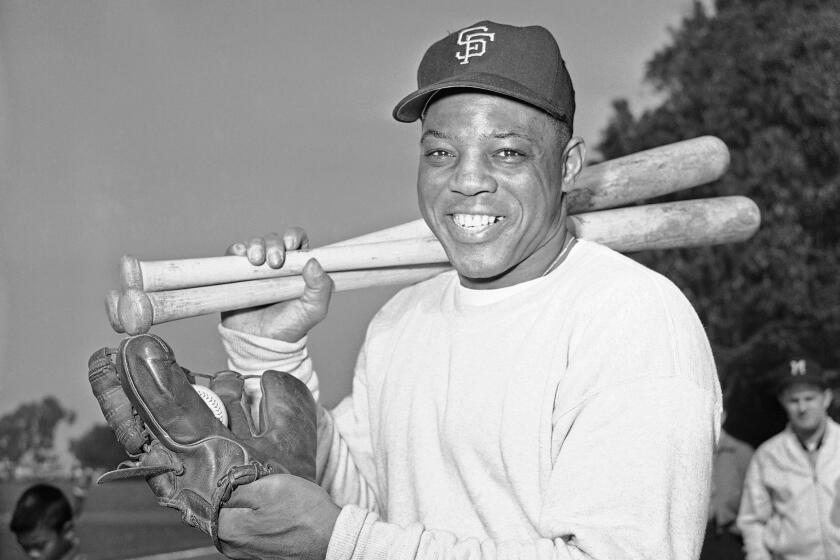Teamsters’ Leader Presser, Target of U.S. Inquiry, Dies
Teamsters President Jackie Presser, facing federal corruption charges and an unprecedented government move to take over his union, died Saturday night in Lakewood, Ohio, from a combination of cancer and heart trouble.
Presser, 61, who had taken a four-month leave of absence from his union post in May because of deteriorating health, was admitted to Lakewood Hospital in suburban Cleveland June 28 with a blood clot on the right lung.
On the same day in New York, federal prosecutors filed a massive civil suit seeking to place the 1.7 million-member Teamsters Union under federal control on grounds that it is controlled by organized crime. The Justice Department suit against the Teamsters, aimed at forcing the entire 21-member executive board out of office, was not aimed solely at Presser and his death is not expected to slow the government’s push to proceed with the case early next year.
Presser, who became president of the Teamsters in 1983, was also facing federal charges of racketeering and embezzlement in connection with allegations that he took $700,000 from union funds in Cleveland, paying it to non-existent ghost employees who performed no work.
A pending criminal trial on the embezzlement charge was indefinitely postponed, however, after a brain tumor was removed from Presser May 17 at the Barrow Neurological Institute in Phoenix.
In announcing Presser’s death, Robert M. Reynolds, head of Lakewood Hospital’s cardiac care unit, said: ‘Mr. Presser’s condition had deteriorated significantly over the last few hours and his cancer and previous cardiac condition contributed to his death.”
Presser, the son of an Ohio Teamsters leader named William (Big Bill) Presser, was an 8th-grade dropout who went to work as a teen-ager delivering juke boxes and pinball machines and wound up with a reported income of $837,000 a year as head of the union. He was a gruff, heavyset union boss who made no apologies for the money he earned.
Cites Responsibilities
“I have as much responsibility of the top executive officers of corporation,” he once said. “Yes, I make big money. But I do big jobs.”
His actual salary as head of the international union, the nation’s largest trade union, was an estimated $600,000 annually. Presser, however, also remained secretary-treasurer of a Teamsters local in Cleveland which he had founded in 1966, reportedly drawing another $237,000 from that job.
In his early years as a Teamsters leader, Presser had a reputation as an expert public relations man for his union. As an official of the Ohio Conference of Teamsters in the 1970s, he worked to improve the union’s image through charity activity and political work.
Moving into the national Teamster hierarchy, Presser continued his public relations efforts in the 1980 presidential campaign, using his influence to gain a union endorsement for Republican nominee Ronald Reagan and ultimately being rewarded for that by being named as labor co-chairman for Reagan’s inaugural.
Presser became president of the Teamsters in 1983 when his predecessor, Roy Williams, was convicted of conspiring to bribe former Sen. Howard W. Cannon (D-Nev.) to help defeat a trucking deregulation bill the union opposed.
Presser began his tenure by continuing his aggressive public relations activities, testifying before a Senate subcommittee in 1983 saying that the Teamsters should be given a chance to move “in a progressive direction” and that he should be judged on his activities, not on the union’s image as a tool of organized crime.
Ties to Mafia?
In its recent civil racketeering lawsuit against the Teamsters, however, the Justice Department concluded that the union’s top leadership, including Presser, had close ties to the Mafia. Government prosecutors have charged that more than 100 Teamster officials and consultants in the last five years have been convicted or charged with crimes ranging from embezzlement to defrauding union health and welfare plans.
In a 1986 report, the White House Commission on Organized Crime concluded that neither Presser nor Williams could have become Teamsters president without the help of Anthony (Fat Tony) Salerno, identified as head of the Genovese crime family in New York.
In recent months during his illness, there were already the beginnings of a power struggle for control of the union even before Presser’s death. Presser’s personal choice to succeed him was Weldon L. Mathis, the union’s secretary-treasurer. However, shortly after Presser’s brain cancer was diagnosed in May, a half-dozen leaders of the union boycotted a meeting called by Mathis.
